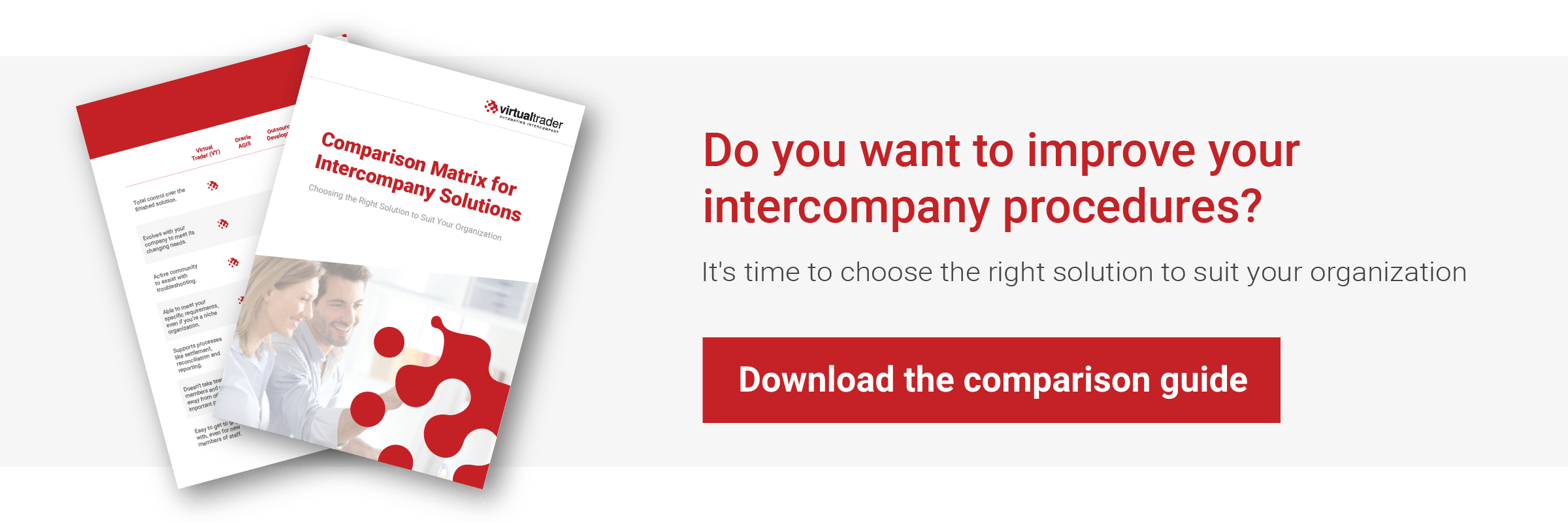Some organizations find that Oracle EBS doesn’t offer some of the specific functionality they need to successfully address their intercompany accounting needs. They often turn to customized solutions — either in-house or via an external team — to meet their bespoke requirements; however, this can be costly and time consuming. Here’s how to extend EBS accounting without customization.
Why Some Businesses Choose to Customize
Oracle EBS is a set of business applications that automates different processes within major organizations, including customer relationship management and enterprise resource planning. It features a wide range of modules that users can install, including Oracle AGIS.
Oracle AGIS gives organizations the tools and functionality they need to automate their intercompany transactions. It’s just one of the modules that sits within EBS, which businesses can then customize if needed.
By customizing Oracle, businesses can implement the exact functionality they need to carry out their intercompany accounting. Oracle EBS and AGIS are incredibly useful, but sometimes they don’t offer the exact features that a niche organization might need. By creating their own customization, they produce a solution that helps them to deal with the challenges they face each day.
How Businesses Customize Oracle
Although Oracle EBS has comprehensive personalization features, some businesses still find that a customized solution is needed to meet their specialized requirements. One of the key features that’s usually added in customized solutions is integration with external systems.
When carrying out intercompany transactions, global organizations sometimes have to deal with conflicting systems. The parent organization might be using one system while a subsidiary is using something completely different — or even just an earlier version of Oracle. Passing journals between the two can be time consuming and complicated.
Integration with external systems is just one of the key customizations that’s sometimes made to Oracle. Others include:
-
New or custom screens to suit a business’s preference.
-
Creation of new reports and/or workflows.
-
A change to business rules or data transformations.
-
Third-party extensions that improve efficiency.
You Don’t Need to Customize Oracle
You can customize Oracle by creating a solution in-house or by tasking external developers with the project. If you don’t already have the specialized skills needed to design a system, you’ll either have to hire new staff or outsource the work. Either way, this is a more costly approach than running standard Oracle. You’ll need to pay the external developers or dedicate valuable internal resources to the task.
For some organizations, it’s not a question of cost. A customization is required because the standard version simply doesn’t have the tools they need to operate.
Even though you’ve customized Oracle EBS, you’re still working within the Oracle platform. This means that any scheduled patches, updates or changes that are pushed live can cause your customized solution to break.
Any time that new architecture is deployed or new technology certificates are released, you’ll have to go through a period of maintenance and testing to make sure the system is still working as it should be. The Oracle team don’t make changes with your solution in mind, so even just one tiny change to the code can create hours of work for your team.
When a new EBS upgrade is released, having a customized version can cause problems. You’ll want access to the latest features and tools within EBS, but there’s no guarantee your solution will be compatible.
You might be too reliant on your version to go backwards and start again but unable to implement the latest EBS enhancements you need to support other areas of your organization. Your organization will be stuck, causing frustration and even stagnation.
Since you’ve spent so much money on a customization, you’ll likely be reluctant to roll it back or transition to something else. This makes your business less likely to want to implement new updates or patches, creating a non-progressive culture.
A customization can also be more of a short-term fix than other available solutions. For example, you might task your in-house team with creating something that works for you; however, five years in the future — when that team has moved on to new roles, projects or even companies — it can be difficult to manage a system that the current team had no hand in creating.
Choose Virtual Trader Rather Than Customization
Virtual Trader allows your organization to streamline and improve its intercompany accounting practices without having to customize Oracle EBS. Like a customized solution, Virtual Trader can manage intercompany trades between differing systems, allowing for a quick and streamlined period close.
You might be worried that your organization deals with niche issues, and that’s why you need a truly bespoke customized system. With Virtual Trader business rules, you’re able to configure it so it does anything you need it to. It’s flexible and scalable.
Unlike other options, it’s able to manage intercompany transactions of intangible goods. This is increasingly important when organizations deal with trades involving warranties, intellectual property, and other non-physical items.
Virtual Trader is just one of the possible solutions your organization could implement. Other possible options for managing intercompany accounting are Oracle AGIS, an in-house developed solution, or an outsourced customization.
To see the advantages and drawbacks of each solution, make sure to download our comparison guide. Being able to compare each easily can help you to make the right choice for your business. To receive your copy, click on the download link below.




 US
+1 800 961 9640
US
+1 800 961 9640

